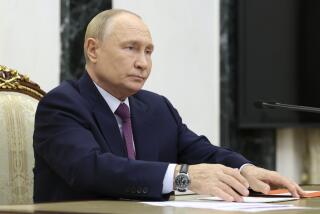U.S. Unworried by Russian Nuclear Stance
WASHINGTON — Secretary of State Warren Christopher said Thursday that he is not worried by Russia’s new, more assertive military doctrine and remains confident that Russian President Boris N. Yeltsin wants to cooperate with the United States.
Christopher told the Senate Foreign Relations Committee that, although Russia abandoned its pledge not to be the first to use nuclear weapons in a conflict, U.S. officials did not consider that move significant because they never had believed the earlier promise.
Christopher said that comments by Russia’s defense minister opposing the enlargement of the North Atlantic Treaty Organization and resisting the complete withdrawal of Russian troops from neighboring Estonia and Latvia are only “personal comments” from one Russian official, not the policy of Yeltsin’s government.
“What we’re seeing here is Russian military doctrine trying to catch up with the new reality in Russia,” Christopher said.
Much of the new Russian policy, announced in Moscow on Wednesday, is actually “good news,” he added.
But some Republicans were critical. “There appears to be much more assertiveness by Russia than formerly,” said Sen. Richard G. Lugar (R-Ind.), a leading GOP foreign policy thinker. “I would think common sense would greet this with some apprehension.”
“I do not read into it the apprehension that you do,” Christopher replied.
“Naturally I’m concerned about the possibility of the expansion of Russia, but I think President Yeltsin is the best ally we have among the choices in Russia today to keep that in bounds,” Christopher said. “I think he respects the territorial integrity of the other newly independent states.”
Christopher, who visited Moscow two weeks ago, said Yeltsin and other Russian leaders--not including Defense Minister Pavel S. Grachev--specifically reaffirmed their intention to withdraw the remaining 20,000 troops from Estonia and Latvia soon.
He said the Russians also agreed to observe “international norms” if they send troops into other former republics of the Soviet Union for peacekeeping duty--meaning that they must have the permission of the local government.
Under Russia’s new nuclear policy, Moscow will only use atomic weapons in self-defense and then only against other nuclear powers or their allies. But it drops a 1972 Soviet pledge that Russia would not be the first to use nuclear weapons, even if the United States were to launch a conventional attack.
More to Read
Get the L.A. Times Politics newsletter
Deeply reported insights into legislation, politics and policy from Sacramento, Washington and beyond. In your inbox three times per week.
You may occasionally receive promotional content from the Los Angeles Times.











